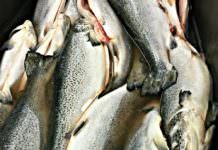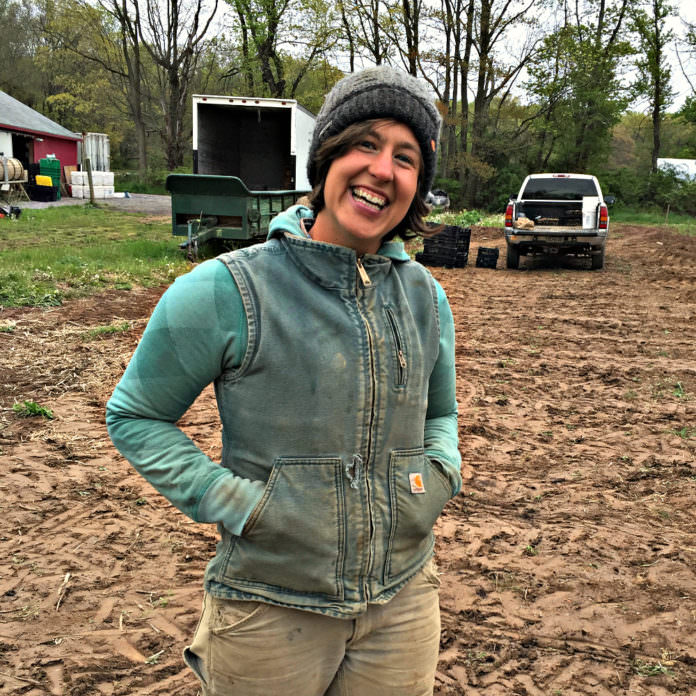
The past ten years—the last five in particular—has seen a large influx of young farmers in Bucks County. They are passionate about growing healthy, fresh food using sustainable and organic practices. In this series, Bucks County Taste interviews these farmers to learn more about who they are.
I find that people are pretty surprised when they meet me and I say that I’m a farmer. I’m a young woman and that doesn’t really fit the mold.
It’s true, Malaika Spencer is a petite, attractive woman, with a broad, warm smile and deep, intelligent eyes. She began Roots to River Farm in Solebury in January 2013, using only organic farming practices. She sells her produce through a community supported agriculture (CSA) business and at farmers markets in Bucks County and New York City.
It’s hard physical work and risky (who can depend on Mother Nature?). You know going in you will never be wealthy but you hope to make a living. But like any entrepreneur, Malaika will tell you it has its rewards.
BCT: How did you become interested in farming?
MS: I started in high school, working during the summer at an organic farm in New Jersey. I really liked the tangible, physical part of the job, and the social part, too, being with people who were interested in this community of organic farming.
Then I learned about the food system in this country and how extremely unhealthy and unsustainable that system is for the planet, for people, and for the animals involved. It solidified my interest in learning how to grow food and distribute it to people directly in a way that was sustainable.
I worked on farms abroad in Costa Rica, Mexico and Italy. I started working in the food industry too—working in kitchens, and at the Bent Spoon in Princeton. I then made the final connection—that food that is grown well and sustainably and by people who are really conscious about it—those ingredients create really good food.
So when I went to college I decided that’s what I wanted to study. I learned soil science, biology, food science and worked at farms at school and in the summers in Massachusetts and New Jersey.

BCT: How did you settle on what you are doing now? How did that evolve?
MS: I tried dairy-farming, I tried cheese making, I tried vegetable farming and worked with cows and sheep and chickens. I really wanted to find my niche.
Everywhere I went I found amazing people doing incredible things. I was constantly inspired. I found that vegetable farming was really my passion and the direct marketing part – that I was growing food directly for people that I would get to meet and know through the CSA model and farmers markets — really grabbed me.
After I graduated from college, I started a little CSA up in the Poconos. I rented land from a small family farm. It was super low risk. I used their equipment and infrastructure, and worked two acres with one other person.
I was able to make all the mistakes without any of the financial risks. That really helped me figure out the systems that I wanted, the marketing tools that I thought were important, the equipment that I wanted – and that I didn’t have!
BCT: I know finding good land can be difficult in Bucks County. How did you find such a great location?
MS: Through my farming connections, I found this property here in Solebury. Natalie Hamill, my landowner, had been farming in New Jersey and that’s how we knew each other. When she bought this place, and knew that I was looking for land, she asked me if I wanted to rent from her. We actually signed our lease before they closed on the property so it was very serendipitous. I could not ask for a better land situation.
As a young person it would be impossible to afford land in Bucks County so leasing is fine to do for the rest of my life. I don’t have a need to own my land. It’s an entirely perfect situation.
BCT: How many acres are you farming?
MS: I lease 13 acres and we grow on about nine. There’s land here to expand which I would like to do, but mostly in terms of rotation. I don’t have aspirations to be a huge farm with tons of different properties. I’d just like to be able to speed things up and rotate a little bit better for soil health.
BCT: This is your fourth season. I know you’ve been using organic practices from the beginning so are you past that three-year mark (for USDA Organic Certification)?
MS: We are. Our organic certification paperwork has been submitted and we are just waiting on PCO (Pennsylvania Certified Organics) to schedule an inspection. We should be certified organic by the end of the year, maybe even within the next few months.
I get to be the mechanic, and the soil scientist, and the potato planter, and the marketer, and the website designer and the accountant. Sometimes I’m the person singing the song while we are weeding. All of that put together makes this really cool daily life that I couldn’t get anywhere else.
BCT: What do you enjoy most about your life?
 MS: I love that I get to do so many different things in the day. Farming is a lot of problem solving so you never know what’s going to happen.
MS: I love that I get to do so many different things in the day. Farming is a lot of problem solving so you never know what’s going to happen.
Usually if we are doing something for the first time that season I’ll say, okay this is the trial day for this task because I know four different things are not going to go the way I planned and we’ll have to readjust.
So being able to play that role and put all these puzzle pieces together to grow food for people is really cool.
I get to be the mechanic, and the soil scientist, and the potato planter, and the marketer, and the website designer and the accountant – some of those things I don’t like as much! Sometimes I’m the person singing the song while we are weeding. All of that put together makes this really cool daily life that I couldn’t get anywhere else.
There is kind of a magic to it. I think a lot of people can relate to the magic of starting seeds and in the end having this thing that’s nourishment. Being able to be that steward is really incredible.
BCT: What do you find the hardest?
MS: For me, mostly it’s the lack of control that comes with farming. You learn to be really flexible and go with whatever happens.
Obviously the weather is a huge factor and it can affect everything from your crops to how much you sell in a week. That’s a really big challenge that is just constantly there.
I started this business with not many resources so we are getting by on a lot of old equipment and figuring out how all that can fit together and what’s going to work and what’s not going to work.

Sometimes you just have no control over what is going to happen in a day. It’s a challenge that I both enjoy and hate!
BCT: What do you want people to know? What do you think they don’t know or don’t understand about what you do?
MS: I think it surprises me a lot of the time when I come up against something that people don’t know like asking, “What is this vegetable? What does it taste like?”
I read an article a few years ago by a farmer who was frustrated when people would ask him what time he wakes up. He’s decided to tell people that he wakes up at 4:30 am, because if you say that you wake up at 3 am then that’s too early, they won’t believe you. But if you say that you wake up at 6 am, they’ll say, “Well, you’re not a real farmer, you’re not working that hard. I wake up at 6 am!”
So there’s this funny, not even misconception, but the way that people look at farming in our culture. Yes, it is really hard work and yes, we do get up early and work all day and it’s physical and it’s really tough but it’s also incredibly rewarding so it almost doesn’t matter.

Sometimes we wake up at eight when it’s raining and there’s no point in coming to the farm. And sometimes we wake up at four because we have to get to market at six. So he decided that 4:30 am was going to be the right time and everyone would be happy with that answer.
That essay struck me and I thought, “Maybe I should just say 4:30. It seems good!”
 I also find that people are pretty surprised when they meet me and I say that I’m a farmer. I’m a young woman and that doesn’t really fit the mold.
I also find that people are pretty surprised when they meet me and I say that I’m a farmer. I’m a young woman and that doesn’t really fit the mold.
But how cool that this career has offered me the opportunity to own my own business at 29 years old. I started at 25 and it’s going fairly well. It’s also the thing that I love to do. It would be hard for me to find an opportunity in something else. That’s one thing that’s pretty incredible.
A lot of small farms are really trying to pay people a living wage…People picking tomatoes in Florida are doing it for a penny a tomato. We are trying to make the system work not only for the land and for the people who are eating the food, but also for the people who are working on the farm.
BCT: One of the things that I hear a lot from people is, “I can get this at Acme for this much. Why should I pay more?” What are some of the economic realities that small farms are up against vs. big ag farms?
MS: There’s always more education to be done about why this food is important. Yes, it’s a little bit more expensive, generally not that much more, sometimes not at all.
 But the amount of labor that it takes to get a plant to a fruit to a market without adding any chemicals or without hurting the land and integrating it into a system that can continue for generations, the value of that is unfathomable even to me.
But the amount of labor that it takes to get a plant to a fruit to a market without adding any chemicals or without hurting the land and integrating it into a system that can continue for generations, the value of that is unfathomable even to me.
And unlike a lot of the big farms, we don’t get any government assistance to grow. Small farming is really capital-intensive. We have to have a certain amount of equipment; we have to have a certain amount of inputs — healthy soil, composts, organic fertilizers.
And farmers are trying to think of new ways to keep their crops more protected with high tunnels and green houses and that all costs a lot of money. Being a small farm we don’t have the economies of scale that big farms do.
We try to get as efficient as possible but labor is huge, it’s definitely the biggest expense. And a lot of small farms are really, really trying to pay people a living wage.
That’s a big difference to people who are picking. The horrible systems of people picking tomatoes in Florida for a penny a tomato. We are trying to make the system work not only for the land and for the people who are eating the food, but also for the people who are working on the farm. And that costs a lot of money.

And, so, trying to explain all of these different things that are going into the products that we are creating and why it costs more than on a big farm, or on a commodity farm where they are growing just corn and soybeans, is hard.
Those farms use much less labor and it’s protein that’s going to animals. That’s a huge difference. Obviously big farming has a lot of expenses but they can take advantage of efficiencies that we don’t have.
And as small farmers in this area we are also creating our own market. There’s not already a system in place that we can jump into like supermarkets. We’re creating this together, for instance, with CSAs, farmers markets and working with chefs who are interested.
That’s also part of the cost of what we do. We can’t just plug into a system that’s already there. We’re building the infrastructure.
BCT: I guess that’s why Bucks County is a great place to be. The infrastructure is pretty much settling in and there is not as much educating of customers that has to happen.
MS: Yes, that’s what is exciting about being here. There is still a lot of work to be done, but there is a baseline of interest, infrastructure and systems in place.
People are excited and that can go so far for the work that we do. When people really do taste and know the difference, and are close enough (in the system) to be able to tell us, that’s the best reward.
BCT: You said we still have a ways to go. What are some of the things that Bucks County and this area need to continue to develop?
MS: I think there is definitely some education with the neighborhood and the township that can be done about what a farm looks like and what a farm needs.
We’ve had issues with our neighbors about how the farm looks and how many people are here every day. We’ve had issues with the township about our high tunnel. We need to educate about why this is happening here, and what it looks like and how it can benefit the people around us.
There’s also a lot of people who are not getting access to this kind of food. Not even people who don’t know what a CSA is but people who can’t afford it or aren’t even near enough to be able to get it.
There’s a huge population just in this county that could really use this food. That’s the next piece. I don’t think the food we grow is that much more expensive. It’s more about access.
Roots to River Farm
67 Pleasant Valley Rd
Titusville, NJ 08560
PH: 215.833.5215
WEB: rootstoriverfarm.com
Email: rootstoriverfarm@gmail.com
Facebook: Roots to River Farm

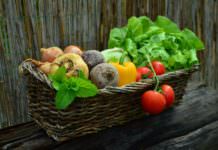


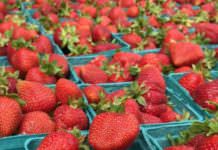
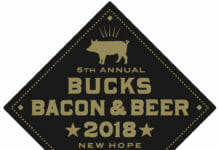


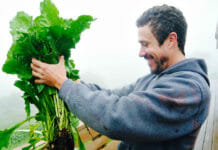
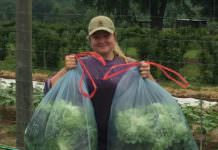
![What we’re reading [Oct 16 2017]](https://www.buckscountytaste.com/wp-content/uploads/2017/10/coffee_macbook_reading_pexels-photo-414630-218x150.jpeg)
